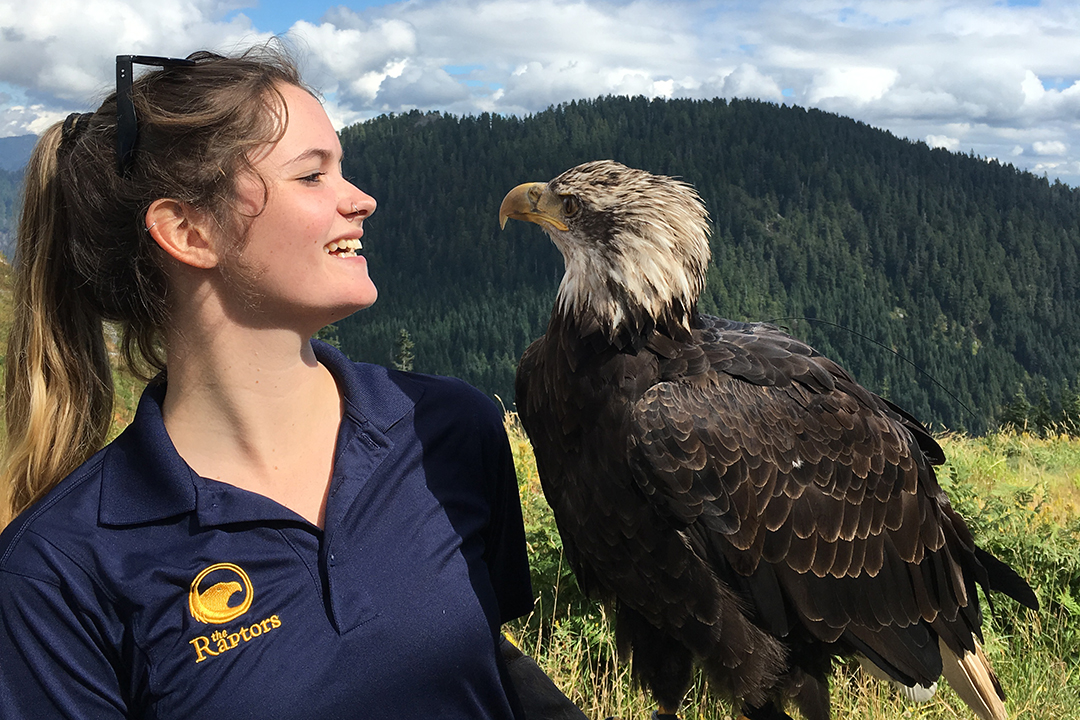
Falconry helped vet student’s career take flight
Pets of all shapes and sizes have always been part of Katie Radcliffe’s life, but the first-year veterinary student’s favourite animals aren’t the soft and cuddly kind.
By Lynne GunvilleShe was five years old when her mother — a wildlife ecologist — founded the Pacific Northwest Raptors to help educate the public about the birds of prey and their importance to the ecosystem. The organization is dedicated to conserving and caring for raptors as well as working with them to provide services such as wildlife management.
“I was surrounded by birds and raptors from a young age, and I trained my first merlin when I was eight – my passion for them only grew from there,” says Radcliffe, who began classes at the Western College of Veterinary Medicine (WCVM) in mid-August.
Starting as a “free volunteer for my parents,” Radcliffe began working in the gift shop and progressed into leadership positions as she got older. She particularly enjoyed wildlife management — an aspect that she views as an applied biological approach to problems such as bird strikes at airports.
Radcliffe also welcomed the chance to work in the organization’s visitor centre where she offered hands-on experiences to the public as well as free-flight demonstrations that educated visitors about the importance of raptors, vultures and other bird species.
“The best part of my work was definitely the animal aspect,” says Radcliffe. “I learned so much about raptor behaviour, and each animal was such an individual — the human-bird bond is really very special. Watching your trained falcon fly and soar thousands of feet above you is an experience unlike any other.”
Radcliffe didn’t seriously consider veterinary medicine as a career until she spent a summer volunteering at an Ecuadorian wildlife rehabilitation centre. She loved caring for the many different wild species — including howler monkeys, capuchins and wild parrots — and she looks back on the experience as a tipping point that inspired her to set her sights on a veterinary career.
Realizing the importance of volunteer and animal experience, Radcliffe worked and volunteered at several organizations and clinics while completing a science degree at the University of British Columbia and working at the family business. She particularly enjoyed assisting the Pacific Northwest Raptors’ veterinarian, Dr. Ken Langelier (WCVM ’81) whom she describes as an incredible teacher and an inspiration.
To extend her scope of experience to small animals, Radcliffe worked at Granville Island Veterinary Hospital and learned a great deal from the hospital’s team of clinicians and technicians, particularly Dr. Anna Wallace (WCVM ’07), who took Radcliffe under her wing.
Radcliffe expanded her avian experience by working a summer at Night Owl Bird Hospital where she benefited greatly from the help of clinic owner Dr. Anne McDonald (WCVM ’76).
As Radcliffe looks back at her background and her volunteer and work experiences, she’s grateful that she had the chance to work with so many people who were passionate about caring for animals. She also appreciates all the support she received from her mother and sister Robyn who continue to operate the family business.
Her family also owns a hobby farm near Duncan, B.C., that includes llamas, turkeys, chickens, ducks and their pet pigs — Marge, Bertha and Ethel. Radcliffe helps with animal husbandry and caring for the farm’s livestock.
Radcliffe is enjoying the practical learning aspect of her courses as well as the chance to get to know her WCVM classmates and “grow her veterinary family.”
Although she plans to keep her options open, Radcliffe envisions a veterinary career in private practice. She also intends to continue working with her family whenever she has the chance.
“In a perfect world, I would be head veterinarian at my family’s company. However, there are still so many fields that pique my interests, and there’s so much to experience and learn before I decide on my path,” says Radcliffe.
“I also hope to continue teaching people about birds of prey, and I plan to have my own hawk eventually — working with them and spending time exploring the outdoors with your bird is an incredible experience.”